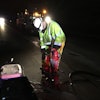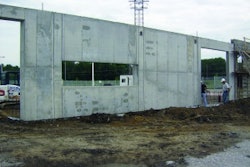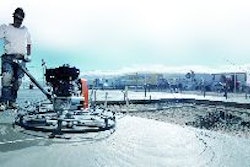
Virginia Gov.-elect Bob McDonnell's transportation plan reflects some constructive original thinking, alongside some stale prejudices. But the highlight of the plan is his description of forthcoming high-occupancy toll lanes on the Beltway: "Few charging mechanisms are fairer -- if you don't use it, you don't pay."
If McDonnell made this the mantra for all of his transportation initiatives, Virginia and the region would be well served. To the extent Virginia -- and particularly Northern Virginia -- needs more and bigger roads, those benefiting from the roads should pay for them.
Instead, McDonnell is willing to offload some of the cost to the sales tax and income taxes -- meaning all Virginians are paying, whether or not they use the roads being built, improved or expanded.
But subsidizing roads with sales and income taxes is not a matter of subsidizing drivers as much as subsidizing developers. Look at the campaign finance figures for the 2002 referendum to raise Northern Virginia sales taxes in order to build more roads in Northern Virginia's exurbs. The numbers paint a clear picture of real estate developers lobbying for a sales tax increase.
Citizens for Better Transportation spent more than $2 million lobbying the public to pass the tax increase. Most of CBT's money -- $1.1 million -- came from the "real estate/construction" industry according to the Virginia Public Access Project. Homebuilder Myron Erkiletian wanted a tax increase so bad, he gave CBT $100,000.
These businesses were building homes, whose value was diminished by a horrid commute into D.C. Builders wanted taxpayers, in effect, to pay for improvements on these new homes. If a developer can't get an acceptable return without a subsidy from the taxpayer, that's a market signal that there is not sufficient demand for more homes way out in Prince William or Fauquier counties.
In other words, more roads and more lanes spur more homes and more developments -- and that doesn't alleviate traffic. The Richmond Times-Dispatch put it well in an editorial during the 2002 tax-increase debate:
"If traffic volume increases along with space, then Northern Virginia will find itself just as clogged as ever. There will be more of the dread 'sprawl.' Developers will make more money, of course -- and residents will pay higher taxes."
Traffic affects people's home-buying decisions and job-seeking decisions. If Route 29 and Interstate 66 are nightmares, many people will decide either to live closer in or work further out. When politicians decide to pave more roads or add more lanes, they aren't alleviating traffic -- they are subsidizing the cost of living in Loudoun and working downtown.
Building roads has many costs besides the tax dollars that go into them. As the Intercounty Connector has shown Marylanders, new highways force people out of their homes, destroy habitats and cause congestion during construction.
Deciding where and how to build roads is tricky, but McDonnell writes in his transportation plan, "A competent government should be able to identify the right projects," and "take into account and mitigate the impacts of those projects."
But conservatives know of an entity much better than government at identifying and building useful projects, the free market. Even if privatizing the interstates is not on the table, approximating a free market in transportation would help.
If a fast Loudoun-to-downtown commute is really more efficient and more profitable for the region than its alternatives -- more offices in Loudoun, or more homes in D.C? If so, then the market will support more lanes on I-66. Let Loudoun's developers or K Street's employers foot the bill for the asphalt -- or just add tolls, which, in the end, would have the same effect.
McDonnell acknowledges the "relationship between land use policies and transportation policy." He pledges to work "with regional planning experts and local government to make good transportation and development decisions."
But McDonnell could replace his "experts" and zoning regulations with market forces: Let those who directly benefit from the roads -- drivers, developers, downtown employers and businesses -- pay for the roads and the peripheral effects.
Unleashing market forces in traffic alleviation and transportation is an idea that pops up throughout McDonnell's transportation plan, but the plan is also interspersed with central- planner notions, such as income-tax-funded road construction and zoning regulations.
Tolls are not a political winner, admittedly, and the developers are politically powerful. But McDonnell -- thanks to term limits -- is already a lame duck. McDonnell could show some courage and tell the developers, "Pay for your own driveway."

















